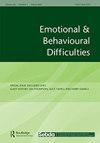Behavioural regulation difficulties at primary and secondary school: risk and protection factors
IF 1.5
Q3 PSYCHOLOGY, EDUCATIONAL
引用次数: 3
Abstract
ABSTRACT The present study aims to analyse the risk and protection factors of a sample group of children and teenagers with special educational needs in primary and secondary schools, who require intensive educational support due to the fact that they are experiencing difficulties with behavioural regulation. A theoretical revision is performed of the different ways of compression, in relation to the conduct disorders, the process of acquisition of the capacity of regulation among children, their relationship with adverse life experiences and finally their consequences in adult life. Age, gender, family socioeconomic status (SES), and clinical diagnosis were collected using a consecutive sampling on one hundred children and adolescents (N = 100) who were referred by the schools to two specialised psycho-educational teams. Risk factors such as the presence/absence of addiction in parents or caregivers, mental disorders, or family history in situations of abuse and lack of protection are also considered. The findings suggest that there exists far more demand for intensive support services among boys versus girls, in secondary schools and within socially disadvantaged families. Protection and risk factors that stand out above the others have been identified. The teachers’ awareness of the presence or absence of such factors among students, should allow early detections that might allow the planning of preventive actions in order to promote a full development of people from the point of view of wellbeing and health. The results are discussed in relation to the importance of adopting a socio-ecological and multisystemic approach to address the behavioural problems that in many cases are interpreted as symptoms or expressions of Adverse Childhood Experiences.中小学行为规范困难:风险与保护因素
摘要本研究旨在分析一组有特殊教育需要的中小学儿童和青少年的风险和保护因素,这些儿童和青少年由于行为规范方面的困难而需要强化教育支持。对不同的压缩方式进行了理论修正,涉及到行为障碍,儿童调节能力的获得过程,他们与不良生活经历的关系,以及他们在成人生活中的最终后果。通过对100名儿童和青少年(N = 100)的连续抽样,收集了年龄、性别、家庭社会经济地位(SES)和临床诊断。这些儿童和青少年由学校转介到两个专门的心理教育小组。风险因素,如父母或照顾者是否成瘾、精神障碍或虐待情况下的家族史和缺乏保护也被考虑在内。调查结果表明,在中学和社会弱势家庭中,男孩比女孩对强化支持服务的需求要多得多。已经确定了比其他因素更突出的保护和风险因素。教师对学生中存在或不存在这些因素的认识应该能够及早发现,从而可以规划预防行动,以便从福利和健康的角度促进人的全面发展。研究结果讨论了采用社会生态和多系统方法解决行为问题的重要性,这些问题在许多情况下被解释为不良童年经历的症状或表达。
本文章由计算机程序翻译,如有差异,请以英文原文为准。
求助全文
约1分钟内获得全文
求助全文
来源期刊

EMOTIONAL AND BEHAVIOURAL DIFFICULTIES
PSYCHOLOGY, EDUCATIONAL-
CiteScore
1.80
自引率
10.00%
发文量
10
期刊介绍:
The central intention of Emotional & Behavioural Difficulties (EBDs) is to contribute to readers" understanding of social, emotional and behavioural difficulties, and also their knowledge of appropriate ways of preventing and responding to EBDs, in terms of intervention and policy. The journal aims to cater for a wide audience, in response to the diverse nature of the professionals who work with and for children with EBDs.
 求助内容:
求助内容: 应助结果提醒方式:
应助结果提醒方式:


